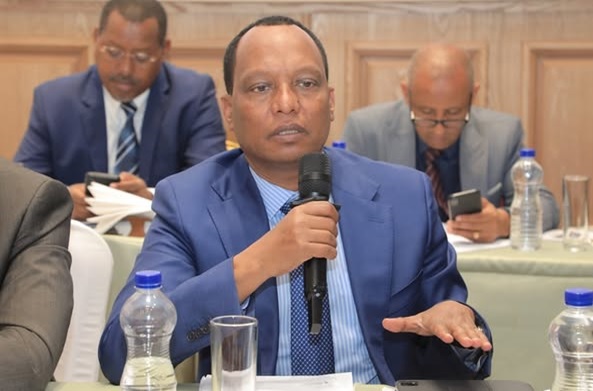
In the last six years, the reforms made in the transport and logistics sector have guaranteed the benefits of the citizens and many successes have been registered. Following the government’s call for private investors to participate in the construction of small airports, preparations are being made to identify construction sites and put them into operation.
The government is consolidating the successful performance of the goals set by air and land transport services. Various procedures have been developed and implemented in terms of modernizing air transport services and expanding accessibility. As a result, encouraging results have been achieved.
Understanding that digital technology is especially valuable for informal public transport, the Ministry of Transportation is working on the unregulated or semi-regulated services that carry so much travel. Digitalization will not solve problems by itself—it must be part of a coherent strategy supported by local expertise and political will.
However, it is a catalyst for moving informal transport toward regulation, subsidy, safer operations, reliable service, and electrification. Digital transport is impactful at every level, from the local to the global, and the world’s journey toward digital transport is only just beginning.
Thus, Ministry of Transport and Logistics is building a digitally enabled transport system to support Ethiopia’s rapid economic growth. “A digitally enabled transport and logistics system is being built to support Ethiopia’s rapid economic growth,” Minister Alemu Sime (PhD) said.
Alemu recently launched officially Ethiopian Maritime Authority’s digital application system that connects transport operators and cargo owners. “It is necessary to use technology in order to respond quickly to the growing population and human needs in the world.”
He noted that many countries are also constantly implementing new digital systems to modernize the services of their institutions. “In the same way, in Ethiopia, attention has been paid to technological development since the reform began to address the problems of service delays, good governance and corruption caused by backward systems.”
For example, in the past few years, digital infrastructure has been built to build an efficient and robust transport and logistics system that is compatible with the nation’s rapid economic growth; he said so mentioning that the application that connects cargo owners and transport operators is one of the problem-solving technological developments in the sector.
By the same token, the General Director of the Ethiopian Maritime Authority, Abdulber Shemsu, has also stated that the digital system will streamline transportation and logistics services. It will play an irreplaceable role in preventing undue third-party interference and artificial price inflation by directly connecting cargo service providers and consumers.
In the same way, Ethiopian Transport Employers Federation, Public Relations Officer, Dejene Luche also said that there was a lot of inconvenience in the sector due to the lack of direct contact between cargo owners and transport service providers previously.
He stated that the digital system that was put into operation will eliminate the inconvenience, avoid the intervention of intermediaries and unnecessary costs, and provides an opportunity to receive faster service.
Similarly, President of the Board of Directors of the Ethiopian Logistics Sector Association, Elisabeth Getahun, has noted that the new digital transport infrastructure is of great benefit to the modernization and growth of the sector.
On the event, the technology system that was developed in collaboration with the Ethiopian Maritime Authority and the United Africa Logistics Technology Company was named “Digital Freight Marketplace systems.”
Likewise, the Ministry is also exerting its efforts to expand non-motorized transportation to enhance clean and green transportation. The road activities in Addis Ababa demonstrate this.
Regarding this, Chairman of the Addis Ababa City Council’s Transportation, Infrastructure and Municipal Affairs Standing Committee, Gizachew Aika, who attended the bicycle festival, said that efforts are underway to make Addis Ababa clean and green by expanding non-motorized transportation.
The Chairman noted that bicycle and pedestrian paths are being extensively built in conjunction with other infrastructure in the ongoing corridor development in the city, adding: “We will jointly develop bicycle transportation services by involving the private sector.”
Equally, Addis Ababa City Administration Transport Bureau Head, Yabibal Addis, for his part, said that the city administration is working hard to promote green transportation. “In addition to the important role that bicycle transportation plays in promoting green transportation, it is essential in protecting users’ health, reducing transportation costs, and dropping traffic congestion”
He also said that the Bureau is undertaking extensive work in the sector to increase the practice as it increases urban tourism. “We are working to expand bike sharing in the city by involving private investors, and everyone should play their part to grow the new sector.”
As a result, the Ministry of Transport and Logistics is working to develop an implementation strategy to expand non-motorized transportation in all cities of the country.
As well, the Ministry has disclosed some of its further plans on its six-month performance evaluation forum. Following the Prosperity Party’s promise to make some improvements, it has disclosed that control stations were reviewed with its plan.
The Ministry’s Logistics Sub-sector Advisor, Tolosa Fufa (PhD), said that understanding the key role that logistics services play in Ethiopia’s economic growth, professionals in the sector are expected to work with great dedication. Logistics services performance has been improving due to the ability to work in coordination with states and other stakeholders to increase efficiency.
He added that in order to enhance the logistics performance of the nation through strengthened control and monitoring, it is necessary to enable the sector to play its expected role in the growth of the national economy by properly fulfilling the responsibilities assigned to it by the control station staff.
Concerning this, Chief Executive Officer of the Logistics Regulatory at the Ministry, Yirga Tadesse, stressed those regulatory experts should focus on solving problems that hinder logistics and streamline services. “By enforcing logistics laws, the number of trucks should be increased and the efficiency of the service has to be ensured.”
At the forum, the 6-month report of the Dewole, Awash, Dicheto, Mojo and Moyale freight transport control work for the fiscal year was presented and discussed. It was noted that both governmental and non-governmental institutions that have a role in streamlining logistics services should pay attention to the development of the sector.
The new airport constructions started in six different parts of the country are at a good level of performance. The procedures and incentive frameworks that have been developed to involve the private sector in the air transportation sector attracting many investors need further attention.
Following the government’s call for private investors to participate in the construction of a small airport, the minister also mentioned that there have been requests to participate in the sector. For this purpose, identifying the sites and providing technical assistance to the investors involved in the construction, preparations are underway to put them into work.
In addition to making air transport safe, modernizing and strengthening the aviation sector in all aspects has been done. Good results were recorded in service delivery and expansion of access in the sector by purchasing new aircraft and putting them into operation in the past six years of the reform. As the sector facilitates the economy in relation to logistics, dry ports like Mojo Dry Port expansion construction that has reached 80 percent need focus as well.
BY DIRRIBA TESHOME
THE ETHIOPIAN HERALD FRIDAY 21 FEBRUARY 2025


